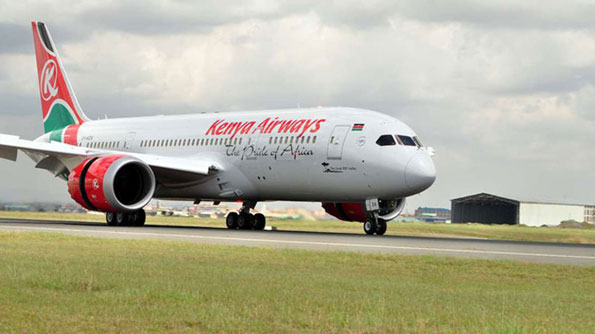A Kenya Airways aircraft at JKIA. FILE PHOTO | NMG The development, which has been elusive for many years, comes at a time the call for creation of a common airspace has been getting louder from different stakeholders who have argued that the move will lower high cost of air transport in the region.
If implemented, the move will enable interoperability and foster seamlessness for the Air Navigation Services (ANS) and enhancement of collaborative activities in the provision of ANS in member states.
Nairobi. K enya has moved the region closer to achieving an open airspace following the decision by the Cabinet to approve establishment, implementation and management of the East African Community (EAC) Seamless Upper Airspace.
The development, which has been elusive for many years, comes at a time the call for creation of a common airspace has been getting louder from different stakeholders who have argued that the move will lower high cost of air transport in the region.
If implemented, the move will enable interoperability and foster seamlessness for the Air Navigation Services (ANS) and enhancement of collaborative activities in the provision of ANS in member states.
This will also lead to implementation of national aeronautical information databases development and operationalisation of the centralised regional aeronautical information database.
The treaty was signed on November 30, 1999 and entered into force on July 7 in 2000, with three original partner States comprising Kenya, Uganda and Tanzania.
Burundi, Rwanda acceded to EAC Treaty on June 2007 and became full members from July 2007. Republic of South Sudan was officially admitted in 2016.
The cabinet, led by President Kenyatta, approved the memorandum of understanding on the establishment of the seamless upper space in last Thursday’s meeting.
International Air Transport Association (IATA) has before pointed out that the reason air tickets have remained high in Africa is lack of common airspace.
According to IATA, African countries need to fast-track the agreements that have been signed, aimed at introducing single airspace to enable passengers to enjoy reduced cost of travel.
“Air travel costs remain high in Africa because of lack of open skies as each country tries to protect their airlines. This eventually affects the passengers,” said, Regional Vice President of IATA for Africa and the Middle- East Muhammad Ali Albakri in an earlier interview.
Mr Albakri said African nations are hurting their economies by protecting their national carriers by their […]
